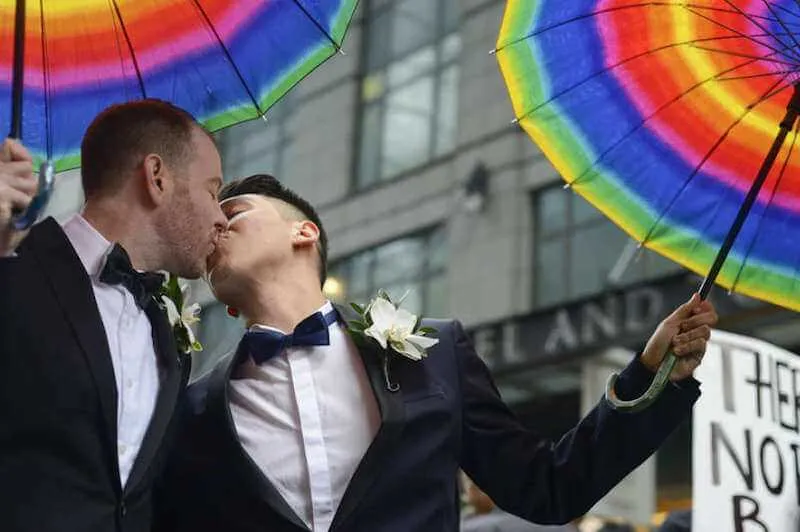Celebrating LGBT Milestones and the Progress Made in Equality and Acceptance

Celebrating an LGBT anniversary is an opportunity to reflect on how far the community has come and acknowledge the strength shown throughout the years. Each milestone marks a moment of resilience, unity, and progress in the fight for equality. It’s a chance to honor those who have fought for the rights we often take for granted today.
Show appreciation by recognizing the achievements and contributions of those who helped pave the way for better acceptance and understanding. This anniversary is not just about celebrating what has been accomplished, but also reminding ourselves of the work still left to do. Use this time to encourage conversations that inspire growth and solidarity.
As you write or deliver your message, consider highlighting the importance of visibility, inclusion, and respect for all identities. Personal stories and shared experiences make messages more meaningful, so take a moment to reflect on how the LGBT community has shaped society. This is the perfect time to send a message of love, support, and affirmation to all those who are part of this vibrant community.
LGBT Anniversary Message
Celebrate your journey and the strength it takes to remain true to yourself. Acknowledge the progress made and the courage shown, as each year represents more than just time passing–it marks the continued fight for equality and visibility. Reflect on personal achievements and share them with your community; your story can inspire others. Stand firm in your pride and continue to support one another, for love and respect are never out of season.
Each milestone matters. Whether it’s the first time you stood up for your rights or a simple act of kindness to someone on the same path, your actions create a ripple effect. Use your voice to highlight the need for more inclusivity and to push for systemic change, ensuring that everyone feels valued and heard.
Let this anniversary be a reminder that while challenges persist, so do the moments of joy and connection that make life richer. Don’t underestimate the impact of your presence and your resilience. Continue to build on the foundation laid before, and inspire others to stand with you in solidarity.
Crafting a Personal Message for LGBT Milestones
Begin by acknowledging the significance of the milestone. Whether it’s a coming-out anniversary, a relationship anniversary, or an achievement within the community, your words should celebrate the personal growth and resilience of the individual or group. Acknowledge their strength and the challenges they’ve overcome, but do so with genuine respect and positivity.
Incorporate personal details. Referencing shared experiences or moments that have shaped your relationship with the person makes the message feel more intimate. Mentioning specific memories shows thoughtfulness and personal connection, whether it’s a funny moment or a moment of support during difficult times.
Use affirming language. Words of affirmation help express genuine support. Highlight their worth, emphasizing that their journey is valuable and meaningful. Avoid generic phrases; make the message as specific to their experience as possible, validating their feelings and actions.
Ensure the tone remains respectful and inclusive. While it’s important to celebrate, avoid language that could feel patronizing or tokenizing. The goal is to make the person feel heard, valued, and appreciated without making them feel singled out in an uncomfortable way.
End with a sentiment of encouragement or hope for the future. Express confidence in their continued growth and your unwavering support. Reinforce that this milestone is just one step in a broader journey of self-expression and empowerment.
Incorporating Inclusive Language in Celebratory Notes
Use gender-neutral terms when addressing people in your celebratory messages. This shows respect for all identities without assuming anyone’s gender. Words like “everyone,” “all,” or “people” are perfect substitutes for gender-specific terms.
- Choose “partner” instead of “husband” or “wife” to encompass all types of relationships.
- Opt for “they/them” pronouns when you are unsure of someone’s gender.
- Use “folks” or “team” rather than “guys” to address a group inclusively.
Acknowledge the diversity of experiences within the LGBTQ+ community. Express support for everyone’s unique journey, avoiding assumptions about shared experiences. Be mindful not to generalize or reduce identities to stereotypes.
- For example, refer to “LGBTQ+ individuals” rather than assuming every member of the community identifies the same way.
- Recognize non-binary or gender-nonconforming people by avoiding the use of “he” or “she” without clarification.
Focus on affirming language. Words like “honor,” “celebrate,” or “appreciate” help convey your respect for the person’s identity and achievements, creating a positive and inclusive atmosphere in your message.
- Instead of “We’re happy for you,” try “We honor your strength and courage.”
- Celebrate each individual’s unique contribution to the community with specific, personal language.
By applying inclusive language, you make your message more welcoming and reflective of the diverse identities that are central to the celebration. Always aim for words that invite everyone to feel seen, heard, and respected.
Ways to Honor LGBT History in Your Message
Highlight key milestones in LGBT history, such as the Stonewall Riots or the passing of marriage equality laws. Acknowledge the struggles and victories that have shaped the community’s path to equality.
Celebrate the pioneers who fought for LGBT rights and visibility, like Harvey Milk and Marsha P. Johnson. Their contributions can inspire hope and perseverance in your message.
Incorporate quotes from influential LGBT figures, ensuring that their voices resonate within your words. These quotes can reflect the ongoing fight for justice and acceptance.
Show support for current LGBT advocacy by mentioning ongoing efforts to combat discrimination, ensuring your message feels timely and relevant.
Offer a message of solidarity, emphasizing unity and the importance of continued support for the LGBT community. Recognize the allies who stand together for equality.
Finally, honor the lives lost to hate and violence, remembering their legacy with respect and dignity. This acknowledgment serves as a reminder of the work still needed to secure a safer, more inclusive future.